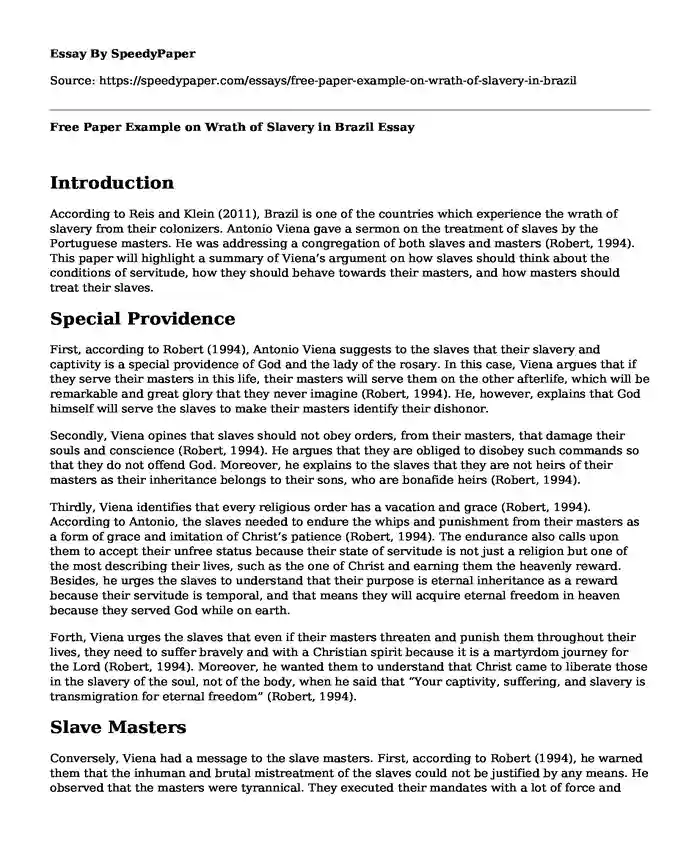Introduction
According to Reis and Klein (2011), Brazil is one of the countries which experience the wrath of slavery from their colonizers. Antonio Viena gave a sermon on the treatment of slaves by the Portuguese masters. He was addressing a congregation of both slaves and masters (Robert, 1994). This paper will highlight a summary of Viena’s argument on how slaves should think about the conditions of servitude, how they should behave towards their masters, and how masters should treat their slaves.
Special Providence
First, according to Robert (1994), Antonio Viena suggests to the slaves that their slavery and captivity is a special providence of God and the lady of the rosary. In this case, Viena argues that if they serve their masters in this life, their masters will serve them on the other afterlife, which will be remarkable and great glory that they never imagine (Robert, 1994). He, however, explains that God himself will serve the slaves to make their masters identify their dishonor.
Secondly, Viena opines that slaves should not obey orders, from their masters, that damage their souls and conscience (Robert, 1994). He argues that they are obliged to disobey such commands so that they do not offend God. Moreover, he explains to the slaves that they are not heirs of their masters as their inheritance belongs to their sons, who are bonafide heirs (Robert, 1994).
Thirdly, Viena identifies that every religious order has a vacation and grace (Robert, 1994). According to Antonio, the slaves needed to endure the whips and punishment from their masters as a form of grace and imitation of Christ’s patience (Robert, 1994). The endurance also calls upon them to accept their unfree status because their state of servitude is not just a religion but one of the most describing their lives, such as the one of Christ and earning them the heavenly reward. Besides, he urges the slaves to understand that their purpose is eternal inheritance as a reward because their servitude is temporal, and that means they will acquire eternal freedom in heaven because they served God while on earth.
Forth, Viena urges the slaves that even if their masters threaten and punish them throughout their lives, they need to suffer bravely and with a Christian spirit because it is a martyrdom journey for the Lord (Robert, 1994). Moreover, he wanted them to understand that Christ came to liberate those in the slavery of the soul, not of the body, when he said that “Your captivity, suffering, and slavery is transmigration for eternal freedom” (Robert, 1994).
Slave Masters
Conversely, Viena had a message to the slave masters. First, according to Robert (1994), he warned them that the inhuman and brutal mistreatment of the slaves could not be justified by any means. He observed that the masters were tyrannical. They executed their mandates with a lot of force and sometimes resorted to dismembering body parts of the slaves, dropping wax and fat on them, cudgeling and slashing them to death (Robert, 1994). Also, Antonio observed that the masters did not allow the slaves to come close to the church; however, they allowed them to continue sinning. Besides, to ensure that all slaves were actively doing assigned chores, the masters did not allow them to marry. However, Antonio argues that the masters should treat the slaves appropriately as they can only enslave their bodies but not their souls. He warned them that they were only enslaving their bodies while the slaves were free in their souls. Moreover, he also foresaw that in heaven, the masters would be dishonored as the slaves receive the highest honors of being served by God himself.
Conclusion
In conclusion, Antonio Viena was a Portuguese priest who had seen how slaves were being mistreated. However, by saying that their suffering was not total slavery, he meant that only their bodies were in captivity, but their souls were not confined and were free to serve God even in captivity.
References
Reis, J. J., & Klein, H. S. (2011). Slavery in Brazil. In The Oxford Handbook of Latin American History.
Robert Edger Conrad, ed. (1994). Children of God's Fire: A Documentary History f Black Slavery in Brazil (University of Park, PA: Pennsylvania State University Press.
Cite this page
Free Paper Example on Wrath of Slavery in Brazil. (2023, Nov 24). Retrieved from https://speedypaper.com/essays/free-paper-example-on-wrath-of-slavery-in-brazil
Request Removal
If you are the original author of this essay and no longer wish to have it published on the SpeedyPaper website, please click below to request its removal:
- Free Essay Sample on Islamic Charitable Organizations
- Historical Essay Sample: Abraham Lincoln's Plans for Reconstruction of United States
- Gender Inequality in the Workplace, Free Essay
- Free Essay on Transgender Rights
- How Have Workplace Cultures Changed in Physical Sciences? Essay Example
- The Process of Neurotransmission - Free Essay
- Essay Sample on Andean Feminism Summary
Popular categories





